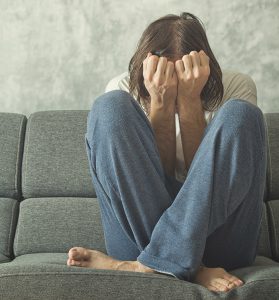On June 1st, Fresh Hope Counsellors and staff will be participating in the 3rd Defeat Depression Walk in Edmonton. I am actually getting quite excited about this campaign. Not just because I will  be getting some exercise with friends, because there is more and more movement to rid the stigma regarding mental health issues like depression. Depression is a treatable mental health condition! In fact, every one of us has a propensity towards depression or anxiety. There are two forms of depression that impact Canadians each year.
be getting some exercise with friends, because there is more and more movement to rid the stigma regarding mental health issues like depression. Depression is a treatable mental health condition! In fact, every one of us has a propensity towards depression or anxiety. There are two forms of depression that impact Canadians each year.
The first kind is situational depression. This happens when something in our life goes awry — a job loss, finding out about a medical illness, infertility, losing a spouse to death or divorce, a serious accident, etc.
 The symptoms may include:
The symptoms may include:
- generally feeling disinterested in life
- feelings of hopelessness and sadness
- sleeping disruption — sleeping too much or too little
- frequent episodes of crying or weepiness
- no longer finding joy in things you used to enjoy
- unfocused anxiety and worry
- loss of concentration and energy
- withdrawal from normal activities as well as from family and friends
- suicidal thoughts
- loss of appetite or eating more than usual
The biggest difference between situational and clinical  depression is that situational depression tends to lift over time and talking things through. It may not kick in right after the ‘triggering event’ but within 3 months. Often the struggle during that time is to accept the changes brought into one’s life by the unwanted event. The sooner a person can come to terms with the new situation and work through the sadness/loss, the sooner the depression lifts.
depression is that situational depression tends to lift over time and talking things through. It may not kick in right after the ‘triggering event’ but within 3 months. Often the struggle during that time is to accept the changes brought into one’s life by the unwanted event. The sooner a person can come to terms with the new situation and work through the sadness/loss, the sooner the depression lifts.
Clinical depression can develop if the person does not recover from the situational depression. Clinical depression is more severe and can impede daily function at work, socially and home. Disturbances in brain chemicals called neurotransmitters are also likely to have occurred. Sometimes there are genetic factors at work, affecting how a person deals with negative situations. Alcohol and drug dependence can also be a factor in the development of clinical depression. Even hormones can impact the neurotransmitters. Depression can even alter a person’s thought processes and bodily functions.  It is a medical issue which requires appropriate treatment.
It is a medical issue which requires appropriate treatment.
A few things that can be helpful in coping with depression are:
- getting some physical activity on a regular basis
- try to eat in a balanced, nourishing way
- talk to those who love you — don’t isolate and shut them out
- join a support group
- take up a hobby or leisure activity
- reach out and volunteer
- go outside and physically change your location for a while
At the beginning you may need to use a skill we call ‘opposite to emotion action’ where you acknowledge how you are feeling but you go ahead and do the behaviour that you know will be helpful for you,  whether you feel like it or not. The feelings won’t change until you do things differently. Don’t wait until you feel better — start doing the helpful things so that you CAN feel better.
whether you feel like it or not. The feelings won’t change until you do things differently. Don’t wait until you feel better — start doing the helpful things so that you CAN feel better.
Research has proven that the most effective treatment for depression is psychotherapy/counselling and medication. Situational depression may resolve with counselling and support, however, severe situational depression may benefit from medication. Clinical depression is a serious health condition which requires attention. Seek the help and support necessary for treatment. Start with a call to a counsellor/psychologist or your medical doctor. There are several forms of support groups and books that can also help alongside doing some of the coping skills listed above.
Help us Defeat Depression! If you would like to support our team in fundraising for this event, please click on the following link https://mdsc.akaraisin.com/ui/DD2019/team/225057




